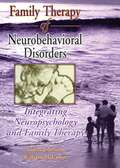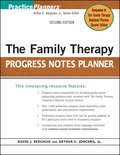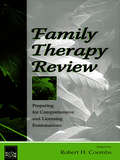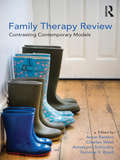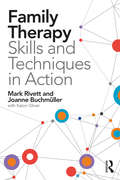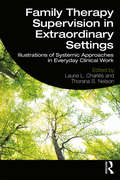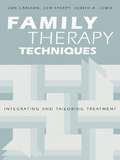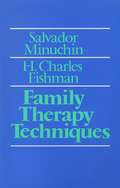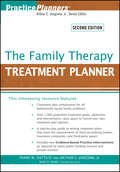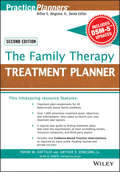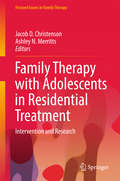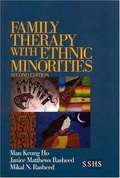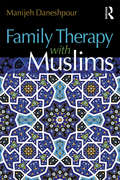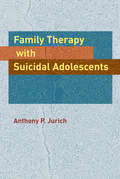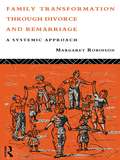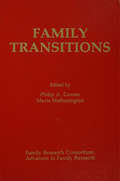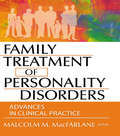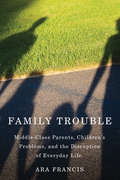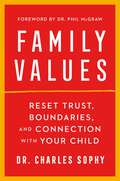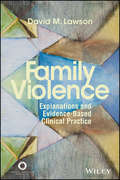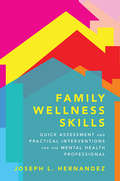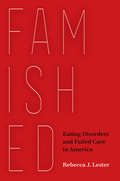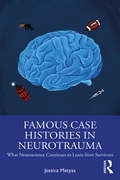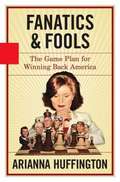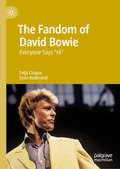- Table View
- List View
Family Therapy of Neurobehavioral Disorders: Integrating Neuropsychology and Family Therapy
by Judith L Johnson William G. McCownFamily Therapy of Neurobehavioral Disorders shows you a unique integration of neuropsychology and family therapy. Authors Judith L. Johnson and William G. McCown span these two broad areas by synthesizing family therapy principles and applying them specifically to traumatic brain injury and degenerative dementia. Family therapists, neuropsychologists, social workers, and counselors working with patients who experience brain dysfunction and their families learn to better address common issues and problems and of therapeutic interventions. This expert book includes case examples and working models of family reactions. The book then extends this information into practical clinical situations commonly confronted in work with these patients and their families. Readers of Family Therapy of Neurobehavioral Disorders are introduced to brain-behavior relationships including neuroanatomy of the brain as it relates to behavior, dynamics of neurologic disorders, and common symptoms of brain dysfunction. You can then use this information to help persons with traumatic brain injury and their families cope with and adjust to the issues and challenges they face. Specifically, you gain invaluable, informative insight into: the neuroanatomy of the brain and which structures mediate behavior, emotion, and cognition common issues families face when a member suffers traumatic brain injury therapeutic strategies and practical suggestions for assisting families mild head injury and familial reactions common issues faced by families confronting Alzheimer’s disease or other dementias a model of family reactions to dementia over timeChapters in Family Therapy of Neurobehavioral Disorders outline symptoms of brain dysfunction and family therapy designed to approach these symptoms. Divided into two sections, the book gives readers a model of traumatic brain injury beginning with the initial onset and proceeding through time. This section focuses on changes within the family and therapeutic strategies for helping these distressed families. Secondly, the authors address degenerative dementia with emphases on certain phases through which family members may progress as they acknowledge their loved one’s condition and then therapeutically work through the reality of it. Professionals in the medical and social sciences will find Family Therapy of Neurobehavioral Disorders a unique and irreplacable guide for developing and understanding the meshing of neuropsychology and family therapy. Also, the book serves as a solid text for students in courses such as rehabilitation, counseling, and family therapy.Translated into Spanish!
The Family Therapy Progress Notes Planner
by Berghuis David J. Jongsma Arthur E.The Bestselling treatment planning system for mental health professionals The Family Therapy Progress Notes Planner, Second Edition contains complete prewritten session and patient presentation descriptions for each behavioral problem in The Family Therapy Treatment Planner, Second Edition. The prewritten progress notes can be easily and quickly adapted to fit a particular client need or treatment situation. Saves you hours of time-consuming paperwork, yet offers the freedom to develop customized progress notes Organized around 40 behaviorally based presenting problems, including family-of-origin interference, depression in family members, divorce, financial conflict, adolescent and parent hostility, friction within blended families, traumatic life events, and dependency issues Features over 1,000 prewritten progress notes (summarizing patient presentation, themes of session, and treatment delivered) Provides an array of treatment approaches that correspond with the behavioral problems and DSM-IV-TRTM diagnostic categories in The Family Therapy Treatment Planner, Second Edition Offers sample progress notes that conform to the requirements of most third-party payors and accrediting agencies, including CARF, The Joint Commission (TJC), COA, and the NCQA Presents new and updated information on the role of evidence-based practice in progress notes writing and the special status of progress notes under HIPAA
Family Therapy Review: Preparing for Comprehensive and Licensing Examinations
by Robert H. CoombsThis book offers a clear, readable overview of all the knowledge and skills those training as marriage and family therapists and counselors need to pass final degree program, certification or licensing examinations. It is organized into three sections: Basic Clinical Knowledge and Skills, Common Client Problems, and Career Issues. Each chapter includes challenging study questions that enable readers to assess their own level of understanding--15 true/false questions at the outset checking on baseline knowledge, 30 multiple-choice questions interspersed through the text underlining crucial points, and 10 provocative discussion questions at the end facilitating synthesis. Each chapter also provides a glossary of key terms and, in addition to references, annotated suggestions for further reading and Web site exploration. Students and trainees will find Family Therapy Review: Preparing for Comprehensive and Licensing Examinations a resource to which they will go on referring long after it has helped them through their examinations; faculty and established professionals will find it a useful one-stop summary of current thinking about best practice.
Family Therapy Review: Contrasting Contemporary Models
by Anne Rambo Charles West AnnaLynn Schooley Tommie V. BoydThis unique text uses one common case to demonstrate the applications of a wide range of family therapy models. Readers will find it useful when studying for the national family therapy licensing exam, which requires that exam takers be able to apply these models to case vignettes. The authors, all of whom are practicing family therapists, apply their chosen model of family therapy to a single, hypothetical case to highlight what each model looks like in practice. Beginning therapists will find the exposure to new ideas about therapy useful, and will be better able to establish which approaches they want to explore in more depth. Experienced therapists and supervisors will find it useful to understand what “those other family therapists” are doing, and to meet the challenge of supervising those from different perspectives. Family Therapy Review is the practical tool therapists need to make sense of the field, and meet the varied challenges their clients present.
Family Therapy Skills and Techniques in Action: Skills And Techniques In Action
by Mark Rivett Joanne BuchmüllerPlease watch the following short video advertisement for the book, featuring the Editors: https://www.youtube.com/watch?v=N1ApHAQIMzQ&feature=youtu.be Relationships are a resource for healing a range of psychological difficulties. This is the fundamental principle of family therapy, an increasingly influential form of psychotherapy that is building up a strong evidence base in a range of psychological problems across the life cycle. Family Therapy Skills and Techniques in Action is both a guide to a variety of family therapy techniques and a review of their history. It provides a thorough explanation of the techniques, explaining their origins and use in contemporary family practice, whilst guiding readers in learning new skills. The authors provide film examples and transcripts of the techniques in action so that readers can develop their skills in a practical way. The book is divided into sections that describe and demonstrate skills such as: Assessing a family; Building a therapeutic relationship with multiple family members; Enactment; Reframing; Using circular questions; ‘Externalising’ the problem; Using family therapy skills in individual work; Understanding and utilising systemic supervision. Family Therapy Skills and Techniques in Action will be an essential practical manual for a range of family therapy skills which can be used in family work by family practitioners from a variety of backgrounds: counsellors, support workers, social workers, psychologists, generic therapists and nurses.
Family Therapy Supervision in Extraordinary Settings: Illustrations of Systemic Approaches in Everyday Clinical Work
by Laurie L. Charles Thorana S. NelsonFamily Therapy Supervision in Extraordinary Settings showcases the dynamism of systemic family therapy supervision/consultation as it expands beyond typical and historical traditions. In this unique collection, contributors write about their innovations, unexpected learnings, and “perfect accidents” in the context of systemic therapy. These essays highlight creative approaches to supervision, present a wide variety of clinical cases and therapy settings, and demonstrate how training takes place in real time. Each chapter illustrates increasingly diverse settings in which systemic family therapy services are delivered, whether in public mental health care for families across high-, low-, and middle-income countries, in areas of armed conflict or instability due to political violence or war, or stable, liberal democracies with robust public mental health systems. Each setting of supervision is extraordinary in the way it supports family therapy service delivery. Given the wide variation in access to systemic family therapy services, and the diverse settings in which systemic family therapy services are delivered, a set of brief, specific, and lively cases is called for that focus on the dynamic nature of a family therapy supervision and consultation interaction and its influence on clients, trainees, and supervisors. Working as a family therapist in the world today, an era of global mental health, is as full of wonder and challenge as it was in the time family therapy originated as a profession. It is thus no accident that supervision and consultation work is just as extraordinary. This book will be essential reading for family therapy and counseling supervisors, as well as a helpful reference for supervisees.
Family Therapy Techniques: Integrating and Tailoring Treatment
by Jon Carlson Judith A. Lewis Len SperryFamily Therapy Techniques briefly reviews the basic theories of marriage and family therapy. It then goes into treatment models designed to facilitate the tailoring of therapy to specific populations and the integration of techniques from what often seems like disparate theories. Based on the assumption that no single approach is the definitive approach for every situation, the book leads students through multiple perspectives. In teaching students to integrate and tailor techniques, this book asks them to take functional methods and approaches from a variety of theoretical approaches, without attempting to reiterate the theoretical issues and research covered in theories courses.
Family Therapy Techniques
by Salvador Minuchin H. Charles FishmanA master of family therapy, Salvador Minuchin, traces for the first time the minute operations of day-to-day practice. Dr. Minuchin has achieved renown for his theoretical breakthroughs and his success at treatment. Now he explains in close detail those precise and difficult maneuvers that constitute his art. The book thus codifies the method of one of the country's most successful practitioners.
The Family Therapy Treatment Planner
by Davis Arthur E. Dattilio Frank M. Jongsma Sean D.The Family Therapy Treatment Planner, Second Edition provides all the elements necessary to quickly and easily develop formal treatment plans that satisfy the demands of HMOs, managed care companies, third-party payors, and state and federal agencies. New edition features empirically supported, evidence-based treatment interventions Organized around 40 main presenting problems including child/parent conflicts, depression, abuse, death and loss issues, blended family problems, and loss of family cohesion Over 1,000 prewritten treatment goals, objectives, and interventions-plus space to record your own treatment plan options Easy-to-use reference format helps locate treatment plan components by behavioral problem Designed to correspond with The Family Therapy Progress Notes Planner, Second Edition and the Brief Family Therapy Homework Planner, Second Edition Includes a sample treatment plan that conforms to the requirements of most third-party payors and accrediting agencies including CARF, The Joint Commission (TJC), COA, and the NCQA
The Family Therapy Treatment Planner, with DSM-5 Updates, 2nd Edition (PracticePlanners)
by Frank M. Dattilio Arthur E. Jongsma Jr. Sean D. DavisThis timesaving resource features: Treatment plan components for 40 behaviorally based presenting problems Over 1,000 prewritten treatment goals, objectives, and interventions—plus space to record your own treatment plan options A step-by-step guide to writing treatment plans that meet the requirements of most accrediting bodies, insurance companies, and third-party payors Includes new Evidence-Based Practice Interventions as required by many public funding sources and private insurers PracticePlanners® THE BESTSELLING TREATMENT PLANNING SYSTEM FOR MENTAL HEALTH PROFESSIONALS The Family Therapy Treatment Planner, Second Edition provides all the elements necessary to quickly and easily develop formal treatment plans that satisfy the demands of HMOs, managed care companies, third-party payors, and state and federal agencies. New edition features empirically supported, evidence-based treatment interventions Organized around 40 main presenting problems including child/parent conflicts, depression, abuse, death and loss issues, blended family problems, and loss of family cohesion Over 1,000 prewritten treatment goals, objectives, and interventions—plus space to record your own treatment plan options Easy-to-use reference format helps locate treatment plan components by behavioral problem Designed to correspond with The Family Therapy Progress Notes Planner, Second Edition and the Brief Family Therapy Homework Planner, Second Edition Includes a sample treatment plan that conforms to the requirements of most third-party payors and accrediting agencies including CARF, The Joint Commission (TJC), COA, and the NCQA Additional resources in the PracticePlanners® series: Progress Notes Planners contain complete, prewritten progress notes for each presenting problem in the companion Treatment Planners. Homework Planners feature behaviorally based, ready-to-use assignments to speed treatment and keep clients engaged between sessions. For more information on our PracticePlanners®, including our full line of Treatment Planners, visit us on the Web at: www.wiley.com/practiceplanners
Family Therapy with Adolescents in Residential Treatment: Intervention and Research (Focused Issues in Family Therapy)
by Jacob D. Christenson Ashley N. MerrittsThis highly practical resource integrates the powerful dynamics of family into residential treatment and outdoors-based therapy for young people. Recognizing both the family as the systemic base for promoting change in adolescents and the therapeutic potential of the residential/wilderness setting, experts show how aligning the two can enhance the healing value of the program while promoting higher standards for care. Chapters describe innovative, science-based interventions and techniques for treating common behavioral and emotional problems along a continuum of family involvement and separation, to address issues affecting the family as well as the identified patient. With its accessible ideas and compelling case studies, the book ably demonstrates the critical role of family in adolescent patients’ successful transition to post-treatment life. Among the topics covered:• A parallel process: home therapy while the adolescent or young adult is in residential care.• Intentional separation of families: increasing differentiation through wilderness therapy.• Emerging family therapy models utilized in residential settings.• Engaging families in Outdoor Behavioral Healthcare.• Research on coping skills used by youth with emotional and behavioral disorders.• Expanding our understanding of the place of family therapy in residential treatment.Family Therapy with Adolescents in Residential Treatment offers novel, exciting, and effective strategies and techniques for practitioners and mental health professionals particularly interested in family therapy with adolescents, and in related interventions and research.
Family Therapy With Ethnic Minorities (Second Edition)
by Janice Matthews Rasheed Mikal N. Rasheed Man Keung HoPraise for First Edtion `There are many good things about the perspective taken in this book. . . an ambitious and creative effort. Provides a starting point on the road to building an alternative therapeutic approach that is sensitive to cultural diversity. It makes an important initial contribution to systemizing knowledge for family therapy so that it is culturally and ethnically specific' - Journal of Marriage and the Family The classic and critically acclaimed book Family Therapy with Ethnic Minorities, Second Edition has now been updated and revised to reflect the various demographic changes that have occurred in the lives of ethnic minority families and the implications of these changes for clinical practice. Family Therapy with Ethnic Minorities provides advanced students and practitioners with the most up-to-date examination yet of the theory, models, and techniques relevant to ethnic minority family functioning and therapy. After an introductory discussion of principles to be considered in practice with ethnic minorities, the authors apply these principles to working with specific ethnic minority groups, namely African Americans, Latinos, Asian/Pacific Americans, and First Nations People. Distinctive cultural values of each ethnic group are explored as well as specific guidelines and suggestions on culturally significant family therapy strategies and skills.
Family Therapy with Muslims
by Manijeh DaneshpourFamily Therapy with Muslims is the first guide for mental health professionals who work with Muslims in the family therapy setting. The book opens with a section defining the similarities across Muslim cultures, the effects of postcolonialism on Muslims, and typical Muslim family dynamics. The author then devotes a chapter to different models of family therapy and how they can specifically be applied to working with Muslim families. Case studies throughout the book involve families of many different backgrounds living in the West—including both immigrant and second generation families—that will give professionals concrete tools to work with clients of their own.
Family Therapy with Suicidal Adolescents
by Anthony P. JurichThis book describes a blend of insight-oriented, behavioral, and strategic family therapy, which the author has developed over thirty-four years of dealing with suicidal adolescents. It aims not to replace other forms of therapy but to augment the therapist’s own therapeutic style. The book offers an informative and personally told story bringing together scholarship and meaningful glimpses into the thought processes of suicidal youth. Written in an understandable, friendly, and practical style, it will appeal to those in clinical practice, as well as graduate-level students pursuing clinical work.
Family Transformation Through Divorce and Remarriage: A Systemic Approach
by Margaret RobinsonFamily Transformation Through Divorce and Remarriage is the first book to look thoroughly at the complete divorce-remarriage-stepfamily cycle in the context of demographic data, the legal process and the theoretical framework. For each phase of the cycle, the author describes the stages of development, summarises the relevant research and illustrates the effects on family members with case examples.
Family Transitions: A Family Systems Perspective (Advances in Family Research Series #Vol. 226)
by Philip A. Cowan Mavis HetheringtonThis volume, the result of the second annual Summer Institute sponsored by the Family Research Consortium, focuses on family transitions--both normative and non-normative. The subject of family transitions has been a central concern of the consortium largely because studies of families in motion help to highlight mechanisms leading to adaptation and dysfunction. This text represents a collective effort to understand the techniques individuals and families employ to adapt to the pressing issues they encounter along their life course.
Family Treatment of Personality Disorders: Advances in Clinical Practice
by Malcolm M. MacFarlaneHelp families cope with the impact of personality dysfunction! Family Treatment of Personality Disorders: Advances in Clinical Practice examines the application of marital and family therapy approaches to the treatment of a wide range of personality disorders. Valuable on its own and doubly useful as a companion volume to Family Therapy and Mental Health: Innovations in Theory and Practice (Haworth), the book integrates traditional individual models with family systems models to provide a multidimensional approach to treating personality disorders. Each chapter is written by a family therapist with extensive experience treating personality disorders and includes a case example, an exploration of the impact of the disorder on family members, a look at cultural and gender issues, and an examination of how the model is integrated with traditional psychiatric services and the proper application of medication. Family Treatment of Personality Disorders is a single, accessible source for significant contributions to the emerging literature on family treatment approaches that, until now, have been scattered through journals representing a variety of disciplines. The book&’s strong clinical focus provides a concise summary of relevant theory and interventions for effective treatment, including discussion of how to manage crises and acting out behavior. Edited by a practicing frontline clinician, the book provides an overview of the personality disorders field, examines the Structural Analysis of Social Behavior model and the Interpersonal Reconstructive Therapy approach, and presents detailed descriptions of key concepts and treatment approaches. Family Treatment of Personality Disorders focuses on specific DSM-IV personality disorders, including: borderline narcissistic histrionic obsessive-compulsive passive-aggressive avoidant dependent paranoid Family Treatment of Personality Disorders: Advances in Clinical Practice is an excellent resource for clinicians treating mental health problems and for academic work in family psychopathology and family therapy and mental health.
Family Trouble
by Ara FrancisOur children mean the world to us. They are so central to our hopes and dreams that we will do almost anything to keep them healthy, happy, and safe. What happens, then, when a child has serious problems? In Family Trouble, a compelling portrait of upheaval in family life, sociologist Ara Francis tells the stories of middle-class men and women whose children face significant medical, psychological, and social challenges. Francis interviewed the mothers and fathers of children with such problems as depression, bi-polar disorder, autism, learning disabilities, drug addiction, alcoholism, fetal alcohol syndrome, and cerebral palsy. Children's problems, she finds, profoundly upset the foundations of parents' everyday lives, overturning taken-for-granted expectations, daily routines, and personal relationships. Indeed, these problems initiated a chain of disruption that moved through parents' lives in domino-like fashion, culminating in a crisis characterized by uncertainty, loneliness, guilt, grief, and anxiety. Francis looks at how mothers and fathers often differ in their interpretation of a child's condition, discusses the gendered nature of child rearing, and describes how parents struggle to find effective treatments and to successfully navigate medical and educational bureaucracies. But above all, Family Trouble examines how children's problems disrupt middle-class dreams of the "normal" family. It captures how children's problems "radiate" and spill over into other areas of parents' lives, wreaking havoc even on their identities, leading them to reevaluate deeply held assumptions about their own sense of self and what it means to achieve the good life. Engagingly written, Family Trouble offers insight to professionals and solace to parents. The book offers a clear message to anyone in the throes of family trouble: you are in good company, and you are not as different as you might feel...
Family Values: Reset Trust, Boundaries, and Connection with Your Child
by Dr. Charles SophyAn essential modern parenting guide for restoring trust and security to your home life from renowned psychiatrist and Dr. Phil Show regular, Dr. Charles Sophy.Over the last twenty years, Dr. Charles Sophy has been a staple on The Dr. Phil Show, where he has guided and coached millions of people begging for assistance with parenting their children. From conflict resolution to substance dependence, Dr. Sophy is the one with the answers. Now, in Family Values, Dr. Sophy has written a guide to rebuilding parent/child relationships to be stronger than ever. Structured around four essential strengths of relationship—trust, shared beliefs, family history, and forgiveness—this book will hit on the hot topics that Dr. Sophy gets asked most frequently for help on, including: -Dealing with power shifts/struggles -Defensive vs. offensive parenting styles -Building/rebuilding your parenting foundation -Eliminating the intergenerational cycle of parental neglect and abuse With compassion and clarity, Dr. Sophy shows how to break free of generational wounds and learn how to create safety, stability, and permanence for your children.
Family Violence: Explanations and Evidence-Based Clinical Practice
by David M. LawsonCounselors-in-training, educators, and clinicians will benefit greatly from this in-depth and thought-provoking look at family violence, its effects, and treatment options. This book examines the major issues and current controversies in the field, provides background information on each type of family violence, and offers strategies for combating domestic abuse. In an informative discussion designed to enhance counselors’ ability to assess and treat each type of family violence, Dr. Lawson covers both well recognized forms of maltreatment, such as the abuse of women and children, and less understood issues, such as female-on-male intimacy violence, parent and elder abuse, same-sex violence, and dating violence and stalking. Case studies throughout the text illustrate clinical applications in action, and recommended readings are provided for further study. *Requests for digital versions from the ACA can be found on wiley.com. *To request print copies, please visit the ACA website here. *Reproduction requests for material from books published by ACA should be directed to permissions@counseling.org.
Family Wellness Skills: Quick Assessment and Practical Interventions for the Mental Health Professional
by Joseph HernandezA psycho-educational model for assessing individuals and families. In Family Wellness Skills, Joseph Hernandez, a longtime Family Wellness trainer and practitioner, shares the foundational concepts of the Family Wellness model to make it accessible to an even broader audience. In it, he provides mental health professionals with a map to guide their clients from recognizing a need for change, to deciding to make a change, to achieving change itself. Hernandez lays out the core ideas behind Family Wellness--chief among them, balancing individuality with connection; fostering skills for interpersonal health (speaking, listening, and cooperating); and developing and maintaining patterns that work for families (mutual respect, parents in charge, interdependence, and expecting change). He shows all helping professionals how to develop effective treatment plans and practical interventions that take into account a family's inherent assets. Family Wellness Skills provides a complete, handy guide to the key points of this successful treatment model, so any mental health professional can help families discover and develop their gifts and abilities, making for stronger, healthier relationships.
Famished: Eating Disorders and Failed Care in America
by Rebecca J. LesterWhen Rebecca Lester was eleven years old—and again when she was eighteen—she almost died from anorexia nervosa. Now both a tenured professor in anthropology and a licensed social worker, she turns her ethnographic and clinical gaze to the world of eating disorders—their history, diagnosis, lived realities, treatment, and place in the American cultural imagination. Famished, the culmination of over two decades of anthropological and clinical work, as well as a lifetime of lived experience, presents a profound rethinking of eating disorders and how to treat them. Through a mix of rich cultural analysis, detailed therapeutic accounts, and raw autobiographical reflections, Famished helps make sense of why people develop eating disorders, what the process of recovery is like, and why treatments so often fail. It’s also an unsparing condemnation of the tension between profit and care in American healthcare, demonstrating how a system set up to treat a disease may, in fact, perpetuate it. Fierce and vulnerable, critical and hopeful, Famished will forever change the way you understand eating disorders and the people who suffer with them.
Famous Case Histories in Neurotrauma: What neuroscience continues to learn from survivors
by Jessica MatyasUsing a popular case history format, this book presents a scientific history of neurotrauma. It covers a range of well-known cases, including Roald Dahl, James Brady, and Walter Freeman to give insights into a variety of neurotrauma causes and effects, from aphasia and amnesia to lobotomy and mercury toxicity. Cases are connected to clinical research methods, exploring how these methods have changed over time and illustrating how these cases are still relevant as we continue to learn about recovery from brain and spinal cord injuries. Focusing on individuals who survived their injuries beyond the acute phase, the book highlights the long-term behavioral effects of the injuries and provides estimates for prognoses and recovery pathways in acknowledgment of naturally occurring neuroregeneration. With helpful key term definitions, Matyas distinguishes fact from fiction to give an accurate account of a wide spectrum of cases and highlight what we can learn from them. Famous Case Histories in Neurotrauma is valuable reading for students in behavioral neuroscience, clinical neuropsychology and related fields.
Fanatics and Fools: The Game Plan for Winning Back America
by Arianna HuffingtonAs America's leaders fight pre-emptive wars abroad and ordinary Americans fight to keep their heads above water here at home, Arianna Huffington offers a no-holds-barred account of where we stand and a clear and remarkable vision of where we should be headed.
The Fandom of David Bowie: Everyone Says "Hi"
by Toija Cinque Sean RedmondBuilt from stories and memories shared by self-defined David Bowie fans, thisbook explores how Bowie existed as a figure of renewal and redemption,resonating in particular with those marginalized by culture and society. SeanRedmond and Toija Cinque draw on personal interviews, memorabilia, diaries,letters, communal gatherings and shared conversation to find out why Bowiemattered so much to the fans that idolized him. Contextualising the identification streams that have emerged around David Bowie, the book highlights his remarkable influence.
